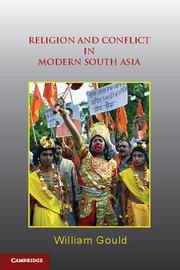Book contents
- Frontmatter
- Contents
- Abbreviations
- Glossary
- Acknowledgements
- 1 Introduction
- 2 Building Spheres of Community
- 3 Transforming Spheres of Community
- 4 Defining Spheres of Community
- 5 State Transformation, Democracy and Conflict
- 6 Forging National Consensus and Containing Pluralism
- 7 New Conflicts and Old Rivalries
- 8 The Resurgence of Communalism?
- Conclusion
- Bibliography
- Index
8 - The Resurgence of Communalism?
1990 to the 2000s
Published online by Cambridge University Press: 05 June 2012
- Frontmatter
- Contents
- Abbreviations
- Glossary
- Acknowledgements
- 1 Introduction
- 2 Building Spheres of Community
- 3 Transforming Spheres of Community
- 4 Defining Spheres of Community
- 5 State Transformation, Democracy and Conflict
- 6 Forging National Consensus and Containing Pluralism
- 7 New Conflicts and Old Rivalries
- 8 The Resurgence of Communalism?
- Conclusion
- Bibliography
- Index
Summary
On 27 February 2002 at around 8:00 a.m., the S6 carriage of the Sabarmati Express burst into flames as it pulled out of Godhra station in Gujarat. Hindus returning from a pilgrimage to Ayodhya organised by the Vishwa Hindu Parishad were either burned or asphyxiated in the carriage. The fifty-nine deaths involved in this incident became a mantra for the Hindu right, and a spur for calculated retribution. The incident was sparked by an altercation between the travellers in the carriage and Muslim hawkers on the platform, and a rumour that the former had abducted a Muslim girl. The event triggered revenge killings, largely orchestrated by organisations of the Hindu right, against Muslims across the state, with estimates of deaths ranging between 790 and 2,000 and involving more than a thousand towns and villages. Some of the worst violence occurred in Ahmedabad where specific businesses were also attacked. In the years following the violence, a range of enquiries have attempted to ascertain whether the initial attack on the carriage was a preplanned Muslim attack on the kar sevaks, an act of spontaneous aggression or simply an accident. What had become clear by early 2005 was that a number of state agencies (in particular, the police) had sought to represent the incident, as well as the ensuing violence, in terms of a preplanned Muslim conspiracy theory. The evidence collected on the Godhra incident was highly unreliable for the most part and largely contradictory. Nevertheless, the Gujarat police invoked the Prevention of Terrorism Act to arrest 123 alleged conspirators, including Deobandis and alleged Islamic militants. In the post-Godhra violence too, a range of complaints and independent enquiries were targeted at the Gujarat police who allegedly stood by or actively participated as the violence (against Muslims in particular, although not exclusively) progressed. India’s National Human Rights Commission reported that much of the violence was premeditated by organisations of the Hindu right. There have also been allegations that acquiescence in and support for the violence reached the very top of the BJP-led Gujarat administration.
- Type
- Chapter
- Information
- Religion and Conflict in Modern South Asia , pp. 269 - 308Publisher: Cambridge University PressPrint publication year: 2011



